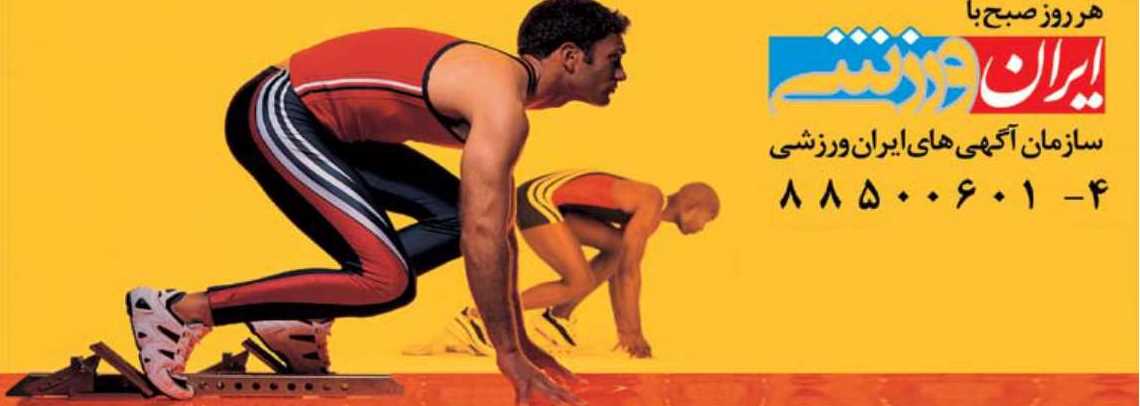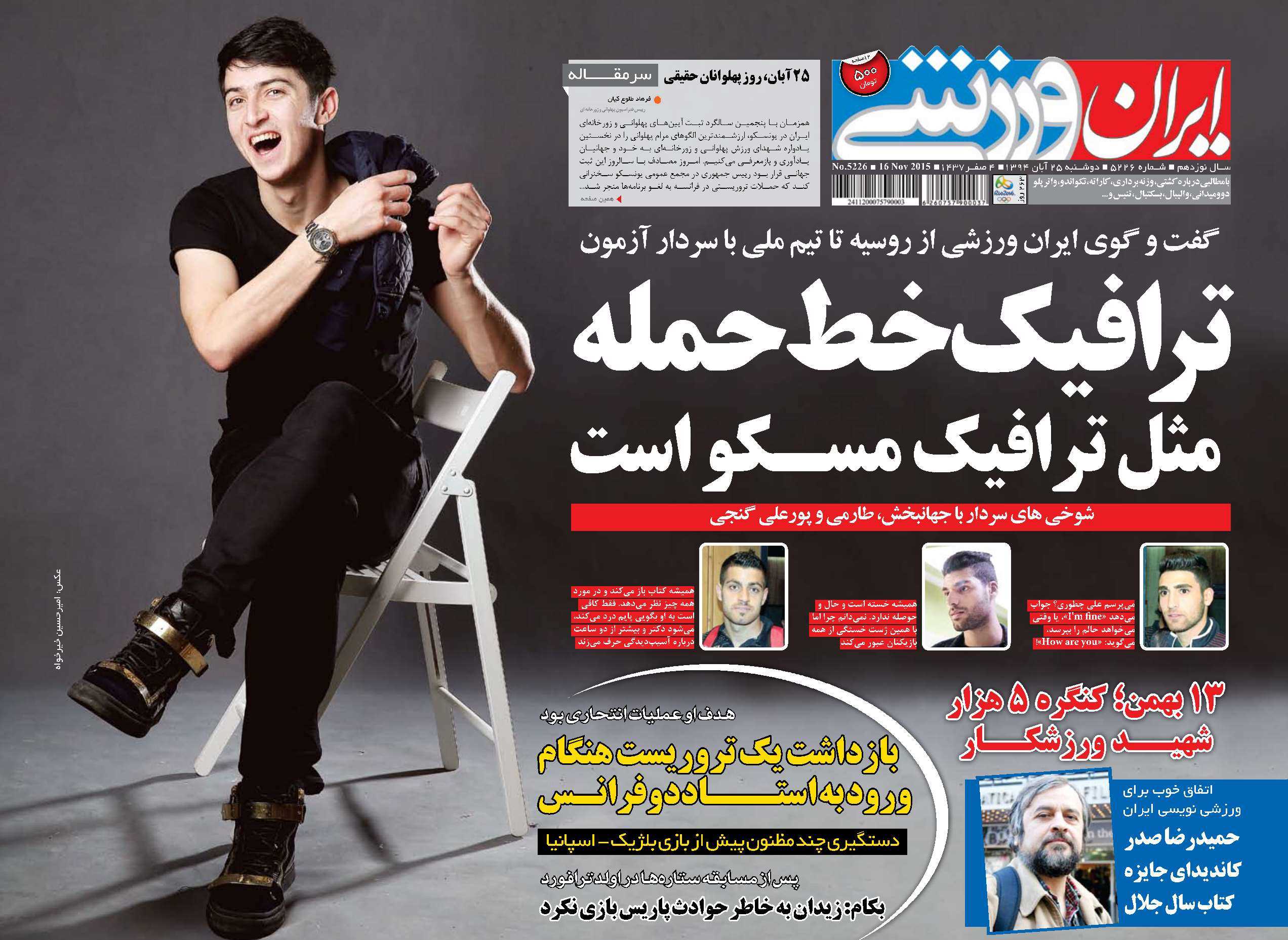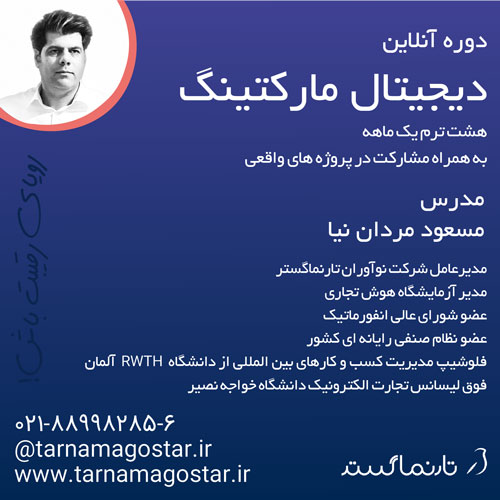عناوین این صفحه
-
یک پرونده باز: آییننامه محدودکننده استخدام خارجیها

-
احتمال کنارهگیری همیلتون از فرمول یک

-
جمعه هم آمد و رفت اما پنجره پرسپولیس باز نشد

-
مشکل عاطفی آقای امباپه

-
یحیی در بنبست!

-
جباری: به اسکوچیچ احترام بگذاریم

-
کیروش: در قاموسم باخت معنا ندارد، فقط برد را میشناسم

-
جنجال، درگیری، فحاشی و بازی نیمهکاره در فوتسال

جستجو بر اساس تاریخ
نظرسنجی
شماره : 6927 /
۱۴۰۰ شنبه ۲۷ آذر
|
|
پس از مقابله با تخلف بزرگ گلگهر
یک پرونده باز: آییننامه محدودکننده استخدام خارجیها
سرمقاله
فرشاد کاسنژاد @Farshadcasnejad
آییننامه استخدام بازیکن خارجی در لیگ برتر ایران اگرچه میتواند مانع استخدام بازیکنان بیکیفیت باشد اما فوتبال ایران به کیفیت فنی و بنیه اقتصادی نرسیده است که در استخدام بازیکنان خارجی چندان بتواند ملاک بازیهای ملی را در نظر بگیرد.
چه بسا به طور مثال بازیکنان آفریقایی پرشماری باشند که در دو سال اخیر چهار بازی ملی انجام نداده باشند اما در لیگ برتر ایران ستاره شوند و بدرخشند.
در اینکه باید مقابل تخلف باشگاه گلگهر سیرجان در استخدام باگناما شدیدترین رأی صادر شود تا جعل مدارک بازیکن هنگام استخدام تکرار نشود شکی نیست اما پرونده این بحث میتواند باز باشد که آییننامه محدودکننده استخدام بازیکن خارجی آیا بر اساس نیازهای فنی تیمهای لیگ برتر و متناسب با کیفیت فنی لیگ ایران نوشته شده است یا خیر.
موضوع دیگر، اقتصاد باشگاههای ایرانی است. به جز باشگاه گلگهر (که به رغم تمول، متخلف هم شناخته شده است) و یکی دو باشگاه دیگر در لیگ برتر که وضعیت مالی خوبی دارند و این وضعیت وابستگی به اقتصاد فوتبال ندارد، ما با خیل باشگاههای بدهکار در لیگ برتر مواجهیم که حتی ورشکستهاند اما به دلیل دولتی یا خصولتی بودن مالکیت، میتوانند ورشکستگی را هر سال تکرار کنند. اینکه توقع داشته باشیم این باشگاهها همیشه توان مالی استخدام بازیکنانی با سوابق ملی را داشته باشند، کمی عجیب و ناهمخوان با اقتصاد فوتبال ایران است.
بازیکنان ناشناس و با کارنامه نهچندان معتبر، پیشتر در همین لیگ برتر به ستاره تبدیل شدهاند و چندین باشگاه برای استخدام آنها در سالهای بعد سر و دست شکستهاند.
قیمت بازیکنان ایرانی در لیگ برتر آنچنان گزاف و نامتناسب با کیفیت فنی آنهاست که استخدام بازیکنان خارجی بدون کارنامه ملی و موارد دیگر در نظر گرفتهشده در آییننامه سازمان لیگ، برای باشگاهها به صرفه است. بازیکنان ایرانی بدون آنکه حتی بازاری در فوتبال آسیا داشته باشند، رقمهایی بیش از ده میلیارد تومان قرارداد میبندند. رقم قرارداد چند بازیکن ایرانی که شاید در هر فصل فرصت انتقال به لیگ قطر یا امارات را پیدا کنند، به ملاک قیمتگذاری روی بسیاری از بازیکنان لیگ برتر تبدیل شده است.
این ناوارد بودن مدیران باشگاهها را نشان میدهد که تن به امضای قراردادهای گزاف میدهند، در حالی که قیمت جهانی بازیکنان ایرانی ارقام ده میلیاردی نیست و بازار جهانی با این ارقام برای آنها وجود ندارد.
جو رسانهای در فضاهای هواداری گاهی قیمت یک بازیکن متوسط را تا چند برابر افزایش میدهد و تجربه نشان داده است که تخلفاتی در قیمتگذاری آنها رخ میدهد.
در چنین فضایی، گاهی ممنوعیت استخدام بازیکن خارجی باعث افزایش قیمت بازیکنان داخلی شده است، مثل فصل گذشته که ممنوعیت حضور خارجیها، بازیکنان ایرانی متوسط را در قیمتگذاری به فوقستاره تبدیل کرد، فوقستاره در قرارداد و بیکاره در میدان مسابقهها. گاهی یک فصل حضور در لیگ قطر، بازیکن ایرانی را با چند برابر قیمت به لیگ ایران برمیگرداند. نمونهاش را در استقلال و پرسپولیس هم پیدا میکنیم. بازیکنانی که در لیگ ستارگان قطر بازار کار نداشتند اما در برگشت به تیم ایرانی، قیمتشان هماندازه نرخهای گزاف فوتبال قطر بود.
الگوی مالی باشگاه ایرانی نمیتواند فوتبال قطر باشد، نه الگویی مناسب و حرفهای است (حتی اگر برگزارکننده جام جهانی بحثبرانگیز ۲۰۲۲ باشند) و نه امکان اقتصادی اجرای آن در لیگ ایران وجود دارد. این تقلیدها در قیمتگذاری بازیکنان نیز جز ورشکستگی پنهانی باشگاههای ایرانی اثر دیگری ندارد.
پرونده بحث درباره آییننامه محدودکننده سازمان لیگ باید باز باشد تا به آییننامهای با بررسی جوانب بیشتر دست پیدا کنیم. به این نکته نیز توجه داشته باشیم که تخصص سازمان لیگ در تدوین این آییننامه هم بحثبرانگیز است.
راننده مرسدس اینستاگرام مسابقات را آنفالو کرد!
احتمال کنارهگیری همیلتون از فرمول یک
رسول مجیدی @Rasoulmajidi
حالا یک هفته از آن یکشنبه داغ و عجیب و غریب ابوظبی میگذرد. یکشنبهای که لوییز همیلتون 57 دور از همه جلو بود و در دور آخر با تصمیم داوران مسابقه، دور پایانی را با وستپن کورس گذاشت و به دلیل نداشتن لاستیک نو، آن دور، آن مسابقه و کل فصل را باخت و بعد از سالها اول نشد. او آماده جشن گرفتن هشتمین قهرمانی جهانش بود اما در یک دقیقه همه چیز برایش پایان گرفت تا وستپن به این جایزه دست یابد.
همیلتون از آن روز به بعد ناراحت و غمگین به نظر میرسد. با اینکه هفته پیش به کاخ ویندزور دعوت شد و لقب شوالیه گرفت اما یکشنبه عصر از جلوی چشمانش پاک نمیشود. او حالا به طور رسمی سر لوییز ویلیامز نام دارد. لقبی سلطنتی که فقط ملکه میتواند به کسی دهد و در انگلستان بسیار ارج و قرب دارد. با این همه حتی مراسم سلطنتی کاخ ویندزور هم نتوانسته او را آرام کند.
همیلتون آنقدر عصبانی است که حتی در اینستاگرام، صفحه رسمی فرمول یک را آنفالو کرده. حالا گفته میشود شاید او به طور کلی قید بازگشت به رقابتها را بزند.
چند روز پیش توتو ولف، به گاردین گفته بود نمیتواند بازگشت همیلتون را تضمین کند. اشارهای آشکار به اینکه شاید راننده افسانهای دیگر مسابقه ندهد.
ولف صحبتهایش را اینطور ادامه داده: «هضم آنچه در روز یکشنبه اتفاق افتاد زمان زیادی طول خواهد کشید. فکر نمیکنم هرگز از آن عبور کنیم، این امکان پذیر نیست. من و لوئیس در حال حاضر سرخورده هستیم. ما از این ورزش ناامید نیستیم. ما این ورزش را با پوست و استخوانمان دوست داریم چون کورنومتر هیچوقت دروغ نمیگوید اما اگر این اصل اساسی انصاف را زیر پا بگذاریم، ناگهان کورنومتر دیگر اهمیت قبل را ندارد زیرا ما در معرض تصمیمگیریهای تصادفی هستیم و واضح است که با تمام کارهایی که انجام دادهاید، با این همه عرق و اشک و خون، اگر شروع به شک و تردید کنید، ممکن است از عشق به این ورزش تهی شوید.»
حالا باید دید این تردیدها و عصبانیتها تا شروع فصل بعد فروکش میکند یا نه. شاید برای رسیدن به جواب این سؤال نیاز باشد تا اسفند صبر کنیم.
باشگاه تا دیشب منتظر اعلام وصول پرداختیها بود
جمعه هم آمد و رفت اما پنجره پرسپولیس باز نشد
ایران ورزشی- از صبح دیروز همه پرسپولیسیها منتظر شنیدن خبر خوش پایان محرومیت نقل و انتقالاتی باشگاه محبوبشان و باز شدن پنجرهای بودند که به خاطر عدم پرداخت مطالبات کالدرون بسته شده اما هیچ خبری نشد.
دوشنبه شب هفته قبل سیدمجید صدری سرپرست مدیرعاملی باشگاه پرسپولیس در برنامه فوتبال برتر اعلام کرد بخش سوم مطالبات کالدرون پرداخت شده و تأیید وکیل این مربی آرژانتینی تا پنجشنبه طول خواهد کشید و روز جمعه فیفا قطعاً پنجره باشگاه پرسپولیس را باز خواهد کرد اما دیروز هیچ خبری از فیفا نشد و باشگاه پرسپولیس هم توضیحی درباره این مسأله نداد.
این ماجرا در حالی بیشتر از یک ماه است کش آمده و طولانی شده که صدری در تجمع اعتراض آمیز هواداران پرسپولیس مقابل وزارت ورزش به آنها گفته بود اگر پنجره باز نشد گردن مرا بزنید!
دیروز در حالی که هیچ خبری از باشگاه پرسپولیس در این خصوص به گوش نمیرسید شایعه شد مسئولان باشگاه تا دیروز منتظر اعلام وصول آخرین واریزی های30 تا 80 هزار دلاری بودند که جمعاً 100 تا 150هزار دلار آن باقی مانده بود.
حتی یک مقام ارشد باشگاه گفته بود شاید تا جمعه شب (دیشب) اعلام وصول آخرین واریزیها داده شود.
با این حساب احتمالاً پنجره نقل و انتقالاتی باشگاه پرسپولیس دوشنبه و پس از تعطیلی شنبه و یکشنبه فیفا باز
میشود.
اگر اینچنین شود بازیکنان تاجیک پرسپولیس که تصور میشد با باز شدن پنجره در دیدار جام حذفی مقابل ویستا توربین بازی خواهند کرد قادر به حضور در لیست این بازی هم نیستند.
باید در نظر داشت بعد از پایان محرومیت باشگاه پرسپولیس پروسه دریافت آیتیسی و صدور کارت بازی این بازیکنان تاجیک هم زمانبر خواهد بود.
امباپه – رئال به مشکل خورد
مشکل عاطفی آقای امباپه
پاریسیها این روزها به هر دری میزنند تا قرارداد امباپه را تمدید کنند تا این بازیکن به صورت آزاد نتواند جدا شود. به نظر میرسد امباپه از رفتار مسئولان پاری سن ژرمن در تابستان ناراحت شده و علاقهای به تمدید قرارداد حتی با ضمانت صدور رضایتنامه در انتهای فصل ندارد.
اینطور شده که 3 غول بزرگ دنیا یعنی رئال مادرید، منچسترسیتی و لیورپول دندان تیز کردهاند تا هر طور شده جوان اول دنیای فوتبال را انتهای فصل و حتی بسته به فعل و انفعالاتی در نیم فصل به خدمت بگیرند. در شرایطی که هر روز به مشتریان امباپه اضافه میشود اما رسانههای نزدیک به رئال مادرید مینویسند کار او با رئالیها تمام شده و این بازیکن قرار است پیراهن رئال مادرید را به تن کند اما این خبر را از قول «دیاریو گل» بخوانید تا بدانید زندگی شخصی بازیکنها تا چه حد میتواند روی آینده فوتبال خودشان، باشگاهشان و حتی باشگاههای دیگر تأثیر بگذارد: کارهای انتقال امباپه به رئال مادرید به این سادگیها نخواهد بود و ممکن است زندگی شخصی کیلیان مانع از چنین انتقالی شود! سایت فوتبال 360 نوشته در گزارشی که «دیاریو گل» کار کرده به این مورد اشاره شده که رابطه کاری جدید کیلیان امباپه با «اِما اسمت» تأثیر زیادی در انتخاب تیم بعدی او دارد. اما اسمت، هنرپیشه ۲۴ ساله فرانسوی به تازگی ارتباط کاریاش با امباپه را علنی کرده است. او دختر داوید و نوه جان هالیدی معروف است. «اسمت» که در زمره یکی از هنرپیشههای آیندهدار فرانسه معرفی شده این روزها درگیر بازی کردن در سریالی است که از شبکه (TF۱) پخش میشود و حسابی سرش شلوغ است. آن طور که «دیاریو گل» نوشته همین مورد امباپه را برای رفتن به مادرید دچار تردید کرده است. این رسانه اسپانیایی نوشته ستاره تیم ملی فرانسه علاقهای به دوری از «اما اسمت» ندارد و اِما هم نمیخواهد با سفر به مادرید و همراهی کردن امباپه آینده شغلیاش را به هم بریزد. این موضوع به حدی است که حالا شایعه شده «اِسمت» میتواند مانع از انتقال امباپه به رئال مادرید شود. نگرانی مادریدیها در این زمینه در شرایطی رو به افزایش است که همین یکی دو روز گذشته «گاتزتا دلو اسپورت» در خبری کاملاً متفاوت از شکرآب شدن ارتباط کاری امباپه و «اسمت» نوشته است.
آنچه بر سر پرسپولیس آمده
یحیی در بنبست!
یادداشت
علی بابازاده
سرخپوشان هنوز مدعی قهرمانی هستند و راه زیادی تا پایان مسابقات لیگ برتر خلیج فارس باقیمانده؛ پرسپولیس در جمع مدعیان باقی مانده اما آن چیزی که باشگاه را بیشتر از هر زمان دیگری به حاشیه میبرد، «خودزنی» مربیان، مدیران و بازیکنان ارتش سرخ است!
با مشخص شدن احکام کمیته انضباطی و به لطف بازنده شدن گلگهر سیرجان در سه مسابقه با پیکان، سپاهان و استقلال، شاگردان یحیی گلمحمدی یک پله در جدول ردهبندی صعود کردند و حالا با سه امتیاز اختلاف نسبت به سپاهانِ صدرنشین در رده چهارم جدول جای گرفتهاند.
برای پرسپولیس آنچیز که در «مسیرِ قهرمانی»های مداوم اهمیت دارد، صرفاً دوری از حاشیه و حفظ آرامش است.
قرمزها هنوز امیدشان را از دست نداده و در تلاش برای بازپسگیری صدر جدول هستند ولی این شب و روز گلایه کردنهای کادرفنی باعث دور شدن ارتش سرخ از پیروزی در جنگ نهایی است!
یحیی که خود را زمانی از عوامل زمین زدن باشگاه میدانست، حالا به مانند سایر تیمها در فصلهای گذشته به انتقاد از زمین و زمان میپردازد و گویا اینکه شاگردانش نمایشهای دلچسبی را ارائه نمیدهند برایش اهمیتی ندارد.
اگر پرسپولیسِ برانکو پس از هر شکست از جانب هواداران تشویق میشد و حتی شب از دست دادن قهرمانی برابر استقلال خوزستان هم تماشاگران را بهوجد آورد، صرفاً به دلیل تلاش، انگیزه و ارائه نمایشهای زیبا و هماهنگ بود.
گلمحمدی خوب میداند که تیم امروزش به بنبست رسیده و اگر هواداران اجازه حضور در استادیومها را نیز داشتند از نحوه بازی شاگردانش لذت نمیبردند و خبری از تشویقهای بعد شکست نبود؛ در بین پنج تیم اول لیگ برتر پرسپولیس با هشت گل خورده در ده بازی آماری دور از انتظار به دست آورده و هرچه میگذرد زخمِ جدایی شجاع و کنعانیزادگان عمیقتر میشود.
شرایط در خط حمله و آمار گلزنی کماکان قابل قبول است ولی همه میدانند که به دست آوردن موفقیت در فوتبال پیشنیازی به اسم دفاع قوی و گلر مطمئن دارد و از بخت بد یحیی خریدهای جدید تا بدینجای فصل عملکرد درخشانی نداشتهاند و اینکه چرا خود او نیز حاضر به استفاده از نفراتی چون علی شجاعی در ترکیب نیست هم جای سؤال دارد.
از ۷ بازیگذشته ۳ برد و ۴ تساوی برای قرمزها به دست آمده. شاید شکست نخوردن فاکتور مهمی در راه قهرمانی باشد اما این تساویهای پرتعداد هم در انتهای فصل «چوب لای چرخ» تیم سرخپوش پایتخت خواهد گذاشت!
دو بازی آینده با ذوبآهن و سپاهان از هر نظر مهم و تأثیرگذار خواهند بود و یحیی برای جبران مساویهای پرتعداد با تیمهایی چون هوادار و مسرفسنجان، مجبور به شکستِ دو باشگاه اصفهانی است.
به نظر فرصتِ آن رسیده تا بهجای ایراد گرفتن از داوری و «تصمیماتِ جهتدار آقایان» که کلیدواژه این روزهای گلمحمدی شده، پرسپولیس به مسیرِ سالیان گذشته و انجامِ فوتبالی شجاعانه برگردد که الحق در آن موفقتر و استوارتر است!
شأن سرمربی تیم ملی باید حفظ شود
جباری: به اسکوچیچ احترام بگذاریم
مجتبی جباری ستاره سابق استقلال اخیراً در یک برنامه اینترنتی درباره شرایط تیم ملی و دراگان اسکوچیچ صحبت کرده است. جباری با حمایت از اسکوچیچ، از اظهارنظر اخیر رئیس فدراسیون در مورد این مربی انتقاد کرد. جباری در مورد عملکرد سرمربی تیم ملی گفت: اسکوچیچ در این مدت کوتاهی که در ایران بوده، کمک زیادی به فوتبال ملی ایران کرده و بابت نتایجی که کسب شده زحمات زیادی کشیده. در صورت صعود به جام جهانی که احتمال آن خیلی زیاد است، مبلغ قابل توجهی به فدراسیون فوتبال میرسد. او با تأکید بر لزوم احترام به اسکوچیچ افزود: فکر میکنم که الان زمانی است که ما باید احترام بیشتری به اسکوچیچ بگذاریم. در حرف زدنها و اظهارنظراتمان باید سعی کنیم از کلماتی استفاده کنیم که در خور شأن سرمربی تیم ملی باشد. هافبک سابق تیم ملی و باشگاه استقلال با انتقاد از اظهارات اخیر رئیس فدراسیون در خصوص اسکوچیچ تأکید کرد: اگر پذیرفتیم و انتخاب کردیم که اسکوچیچ سرمربی تیم ملی فوتبالمان باشد، باید احترام او را هم حفظ کنیم. وقتی از آقای عزیزی خادم میپرسند که نظرتان راجع به آقای اسکوچیچ چیست و ایشان میفرمایند که فعلاً هست! اگر صحبتی ندارند، انجام ندهند ولی اگر میخواهند اظهارنظر کنند، بهتر است به گونهای صحبت کنند که جایگاه این مربی حفظ شود که با یک مبلغ مناسب آمده و نتایج خوبی هم گرفته است.
به دنبال شکست قهرمان آسیا هستم
کیروش: در قاموسم باخت معنا ندارد، فقط برد را میشناسم
کارلوس کیروش سرمربی تیم ملی مصر بعد از باخت به تونس به شدت از سوی هواداران مصری مورد انتقاد قرار گرفت و بسیاری از کاربران خواهان برکناری مربی پرتغالی شدند. با این وجود او بدون اعتنا به فضای راه افتاده، به دنبال موفقیت در بازی ردهبندی عرب کاپ است. کیروش پیش از دیدار با قطر در ردهبندی جام کشورهای عربی بعد از باخت مقابل تونس گفت: در قاموسم شکست معنا ندارد. تنها چیزی که میدانم برد است و آموختن از اشتباهات گذشته. سرمربی اسبق ایران ادامه داد: من مشکلی با هیچ بازیکنی ندارم. همه بازیکنان برای بازی با تیم ملی مصر آماده هستند. من اینجا نیستم درباره بازیکن مشخصی صحبت کنم. هر بازیکنی آماده بازی باشد بدون شک در ترکیب قرار میگیرد. کیروش عنوان کرد: به تونس باختیم اما باید به نکات مثبت این بازی نگاه کنید. ما در مسیر درستی قرار داریم تا بتوانیم نسل جدیدی برای تیم ملی مصر بسازیم. من از عملکرد بازیکنانم رضایت دارم و آنها باید از اشتباهات گذشته درس بگیرند. در بازی فردا مقابل قطر برای برد وارد زمین میشویم تا قهرمان آسیا را شکست دهیم و سومی جام کشورهای عربی را کسب کنیم.
حواشی در لیگ برتر امیدها
جنجال، درگیری، فحاشی و بازی نیمهکاره در فوتسال
در جریان سومین روز از مسابقات لیگ امیدهای فوتسال که از دو روز گذشته آغاز شده، در دیدار تیمهای گیتیپسند و فردوس قم در گروه اول و در سالن شهید بهشتی مشهد به دلیل اعتراض و درگیری سرپرست نماینده قم مسابقه نیمهتمام ماند. این اتفاق در حالی رخ داد که قمیها معتقد بودند قبل از گل اول گیتیپسند روی بازیکن فردوس خطایی رخ داده و داور نگرفته، این موضوع اعتراض شدید سرپرست فردوس را به دنبال داشت و باعث اخراج وی شد. در ادامه پس از به ثمر رسیدن گل سوم گیتی پسند، ابراهیم جوکار سرپرست اخراج شده قم با ورود به زمین و در اقدامی قابل تأمل پس از اعتراض به داوری اقدام به فحاشی به خانواده ناظر داوری مسابقات کرد و این بار با دخالت نیروی انتظامی از سالن به بیرون برده شد. به فاصله ۵۲ ثانیه به پایان این دیدار جنجالی، پس از گل پنجم گیتی پسند در حالی که تیم فردوس ۵ بر ۲ از حریف عقب افتاد، نماینده قم اقدام به ترک زمین کرد.
|
|
آدرس مطلب:
آدرس مطلب:
آدرس مطلب:
آدرس مطلب:
آدرس مطلب:
آدرس مطلب:
آدرس مطلب:
آدرس مطلب:
آدرس مطلب:
|
ویژه نامه | آرشیو































